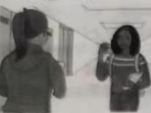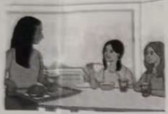You may often hear some myths(传言)about animals. For example, one dog year equals about seven human years, chameleons(变色龙)change color to match their environment... Today, let's talk about birds. It is said that if you touch a baby bird, the parents will completely abandon(抛弃)it. Do you really believe it?
In fact, most birds have a very poor sense of smell, so in most cases are unable to even notice the smell of humans on baby birds. Not only that, but most types of birds aren't so quick to abandon their young when they sense danger. Some types will even do their best to protect their young when they are in danger.
Indeed, in very few known cases, parent birds sometimes abandoned their nests from something touching their young, just because they noticed it by sight, not smell. When this happens, the parent birds usually won't care, other than to be a little more careful than normal. Sometimes, they may temporarily(暂时地)abandon the nest in order to better watch whatever disturbed their nest comes back.
What's more, in most cases, even if the nest is destroyed by wind or something to that effect, you could create a new one and put all the baby birds back in it, and when the parents came back, they wouldn't care their baby birds were in a different nest, so long as you put the new nest near where the old one was so they can find it.
(①=Paragraph 1(第一段), ②=Paragraph 2…)
 B .
B .  C .
C .  D .
D . 
What is your dream job, a pilot or a policeman? What do you hope your job is like? Read the following stories and find more at www. cambridge. org/aw/cambridgeenglish.
|
|
The sweetest job Harry is only 12. but he is working for a sweet company. His job is probably the best in the company—the sweet tester. When a new sweet is invented, Harry eats it, writes report about it and sends his report to the factory. And then a decision is made about whether to make the sweet or not. As a child, he's too young to work for money. But he gets free sweets! |
|
|
Desert Island Blogger Do you wish to live on an island and get paid? Ben got such a job, but it was hard work! He had to live alone in a house (with a swimming pool) on Hamilton Island and spend every day swimming, exploring and relaxing. Then he had to write a blog to show his findings and feelings. |
|
|
Sleeping on the job Usually, sleeping on the job is a big problem—if you fall asleep, you'll lose the job! But Roisin was paid to sleep on the job. She slept in designer beds eight hours a day , every day for a month, and tested them to see what makes "a good night's sleep. " In the end, Roisin had to write a report about the beds. |
Making friends at school can be a little tricky - but it doesn't have to be! Try out a few of these methods to talk to people in your class and hang out with them outside of school. Before you know it, you'll have a group of friends to have fun with every day!
■Be friendly.

Using proper body language will help, Stand up straight, make eye contact with people, and smile! Try to avoid crossing your arms over your chest and looking closed off. The more open and friendly you look, the more people will want to get to know you.
■Sit at a new table during ▲ .

Look for tables with an open seat. If you're feeling a little nervous, pick a table that only has one or two people sitting down. Head over and ask if you can sit there, then join in on the conversation. If you like the people you sit with, ask if you can join them again the next day.
■Try out for a sports team.

Pick a sport that you like (it could be soccer, basketball, softball, baseball, or anything in between), and try out for the team. Over time, you could become good friends with some of the other people on your team! If your school doesn't have a sports team, try looking for one at your local community center.
■Join an after-school club.

Meet friends who have the same hobby as you. Ask a teacher or your parents for a list of after school activities and pick 1 or 2 of them that you're the most excited about. Introduce yourself to everyone when you attended your first club meeting to meet new people and start a fun conversation.
Yesterday, I read a report on fruit- picking robots. As I heard about the pricey robotic arms of these machines, I was filld with something like sadness. Our children and grandchildren, I'm afraid, will not be able to understand how our food is grown. Nor will they be able to experience the fun of fruit-picking.
I once spent a few weeks on a farm in New Zealand. There, I met about 50 apple pickers from Vanuatu. At night, we listened to pop music and washed our clothes as they told me about their experiences of picking pineapples and peaches. Life on the farm was hard. The rooms were small and dark. There was nothing in them but a kettle (水壶) and a shower. However, the trip left me with many fond memories.
When my son was little, I used to cycle him half an hour out of town to a farm every few weeks. There, we could pick strawberries. He loved it. He was excited about the smell of the plants, the feel of the soil and the art of guessing which piece of fruit had the potential to be the most delicious. And he saw where our fruit came from. I wanted him to understand the effort and energy during the process of producing food.
Doorstep deliveries and washed and sliced (切好的) salad vegetables have already started to destroy our understanding of how our food is grown and what it looks like. Robotic fruit-pickers, I fear, will be just another step in this direction. I'm afraid that we are making the whole act of eating a hands off experience. Where is, then, the fun of it?
 B .
B .  C .
C .  D .
D . 